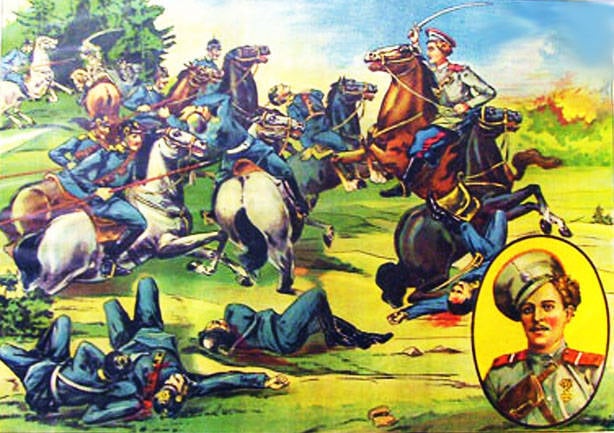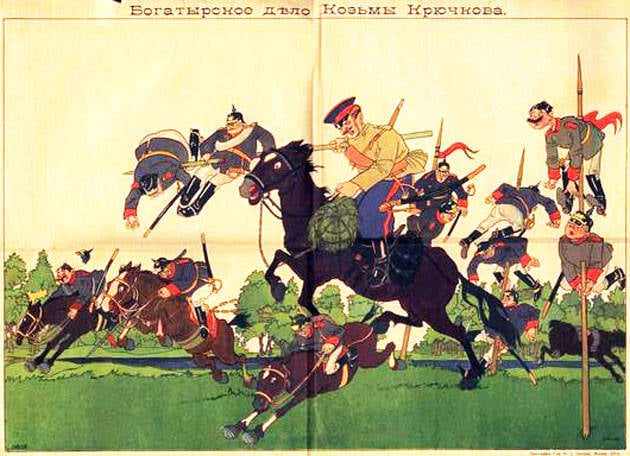The reason for the defeat of Russia in the First World War was not a military factor
Serbs accepted almost all the conditions, while Serbian Prime Minister Pasic Serbian showed miracles of diplomatic flexibility, accepting all points of the Austro-Hungarian ultimatum, except one - the Serbs, instead of allowing the Austrians to investigate the territory of Serbia, offered to transfer the matter to the Hague International Court, promising to accept it decision.
Oddly enough, this war for modern Russia remains largely a “terra incognita”. In Soviet times, this concept was largely inherited and historical school of the Russian Federation, it was believed that this war was lost by the Russian Empire because of its "backwardness." At the same time, the successes of the Russian army on the fronts were covered rather little, and its failures were maximized. So, our troops successfully defeated the Turkish army on the Caucasus front (see the article of the Caucasian Front in the First World War). The Russian Black Sea Fleet successfully operated at its theater of operations, by 1917 completely controlling the situation and preparing the Constantinople landing operation, which could have become a brilliant conclusion to Russian Eastern policy - Tsargrad would become another capital of the Russian Empire, and the Bosporus and Dardanelles would become ours, strengthening our geopolitical position in the world (see the article of the Black Sea Fleet during the First World War). It was during the First World War on the Black Sea navy in fact, carrier-strike groups were created. In this matter, Russia was among the world leaders.
Failures were not only in Russia - all the great powers in this war had failed operations. And Russia was considered a great military power, the main combat force of the Entente. She alone held the front against the three empires (great powers) of the time: German, Austro-Hungarian and Ottoman. And two of them beat more than once - the Austro-Hungarian and Ottoman empires. The Russian army conducted the Galician operation and the famous Brusilovsky breakthrough (perhaps the only operation that was fairly well covered) against Austria-Hungary. Magnificent victories on the Caucasian front were won: Sarykamysh operation (9 (22) December 1914 of the year - 4 (17) of January 1915 of the year), during which the Turkish 3 army was completely defeated, it almost ceased to exist; won in the battle of Van (April-June 1915 of the year); in October-December 1915, the commander of the Caucasian army, General Yudenich carried out a victorious Hamadan operation, this operation prevented Persia from entering the war on the side of the German Empire. In late October, Russian troops landed in the port of Enzeli (Persia) and by the end of December, pro-Turkish armed forces broke up and took control of the entire territory of Northern Persia, thereby ensuring the left flank of the Caucasian army. In 1916, successful Erzerum and Trapezund operations were carried out: the Erzerum fortified area was captured - including the “impregnable” Erzerum, re-defeated, the 3-I Turkish army was actually destroyed; The strategically important port of Trabzon-Trebizond was captured, a base of the Black Sea Fleet and a supply base of the Caucasian Army were created there. The Russian Empire achieved great success in this area after the war, and legally this fact was recognized by other Entente powers, the Russian state would have received the regions of Erzerum, Van, Bitlis, Trabzon, part of Kurdistan.
We should not forget that the Russian army not only smashed the Turkish and Austro-Hungarian troops, but also successfully fought with the first-class German army: it was the elimination of the Svencian breakthrough, the Warsaw-Ivangorod operation and the defeat of the shock group of Scheffer during the Lodz operation.
That is, one should forget about myths like “worthless generals”, “backward country”, “weak economy”; By the way, about the economy: the Russian Empire was the only country where economic growth was going on during this war. It is clear that there were problems, but the main cause of the death of the empire, its official defeat (the Brest peace) was not a military or economic factor, but a political one. Internal and external enemies were able to organize two revolutions, which became the cause of defeat. So, the 1916 campaign of the year was quite successful for our armed forces, the economy was successfully rebuilt on “war rails”, stocks of weapons and ammunition were created, the army was ready to make a turning point in the war in 1917. So, the Entente countries, even without the Russian Empire, won the war, it is clear that with the participation of the Russian army, the victory would have been achieved faster. The reserves created for the 1917 campaign of the year: shells, cartridges, rifles, machine guns, uniforms, then the Red Army sufficed for the entire Civil War (when almost the entire industry, including the defense industry, rose), remained even after it.
But February 1917 of the year happened, and the army, the country were thrown into the chaos of anarchy and powerlessness. The spirit of the army, society was undermined, the front began to fall apart. If Nicholas II, like Stalin in 30-s, had destroyed the fifth column in the country, the alignment on the planet would have been completely different. The author does not deny the shortcomings of the Russian empire, but still it must be remembered that the main reason for the defeat in World War I was not a military or economic factor (although there were many shortcomings there), but a political one.


Poster “The Powerful Work of Kozma Kryuchkov” During the First World War, the name of Kuzma Kryuchkov was known to all of Russia. The brave Cossack flaunted on posters and leaflets, cigarette packs and postcards, his portraits and drawings depicting his feat were printed in newspapers and magazines. A Cossack distinguished himself in the first days of the war in battle with German cavalrymen near the Polish town of Kalwaria. The Cossack sentry guard headed by him joined the battle with a group of German cavalrymen, and, as recorded in the award documents, Kuzma Kryuchkov personally cut himself down with a sword during the cavalry fight and smashed people 11 with a lance.
Sources of:
Utkin A.I. The First World War. M., 2001.
Shabarov V. Ye. For the faith, the king and the Fatherland! M., 2003.
http://topwar.ru/4564-tayna-saraevskih-vystrelov.html
http://topwar.ru/2722-kavkazskij-front-v-pervuyu-mirovuyu-vojnu-chast-1.html
http://topwar.ru/2745-kavkazskij-front-v-pervuyu-mirovuyu-vojnu-chast-2.html
http://topwar.ru/2916-kavkazskij-front-v-pervoj-mirovoj-vojne-chast-3.html
http://topwar.ru/2795-chernomorskij-flot-v-gody-pervoj-mirovoj-vojny.html
http://topwar.ru/2836-chernomorskij-flot-v-gody-pervoj-mirovoj-vojny-chast-2.html
http://topwar.ru/2884-chernomorskij-flot-v-gody-pervoj-mirovoj-vojny-chast-3.html
http://topwar.ru/2892-chernomorskij-flot-v-pervuyu-mirovuyu-vojnu-chast-4.html
Information